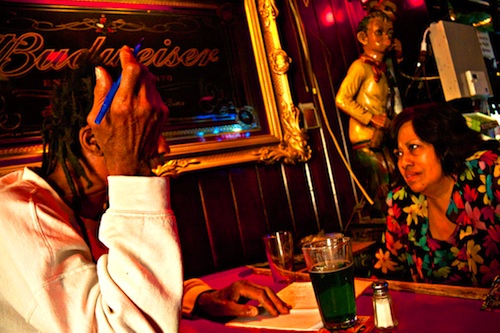
With nearly all pursuits, being a pro means you get paid, but in poetry, a professional poet is one who has paid quite a lot to attain that dubious title, with precious few seeing any return for their investment. Since I don't own a BA, MFA or PhD, and have never paid for a single workshop or sent a check to enter a book contest, since I've never coughed up any money to become a poet, in short, I can safely be called an amateur, which is fine by me. I join those legions who write poems when they feel like it, and except in extremely rare instances, I've stopped submitting to journals, since these are barely read anyway. Also, in what other endeavor must one submit just to have an overwhelming chance to be rejected? Talk about abject! Years ago, Clayton Eshleman's Sulfur taught me a few things, but that was years ago.
As an amateur poet, I enjoy meeting my peers, and in El Paso recently, I lucked into a gentleman who had a vaguely rhythmic specimen permanently lodged in his head. Poet and publisher Bobby Byrd will kill me for being in El Paso without seeing him, but I was only in the area for a day to photograph El Paso and Juarez. With no time to spare, I skipped out on Bobby, and at the end of that one day, I found myself at The Tap, a divey, old man's bar downtown. The dude to my left was friendly, so I talked to him. A retired Vietnam vet, he had spent 13 years in Juarez, but the increasing violence and extorting cops chased him back stateside. We did agree, though, that Juarez had its sweetness and charms. It's not just cops with assault rifles and flyers everywhere seeking loved ones. At any time of the day, it's more alive than El Paso, that's for sure. With its bustle and colors, Juarez reminded me very much of Vietnam, I told him, and he concurred, "But if they feel like shooting you, they'll shoot you right in the middle of a crowd. Even if it's sixteen bullets, they'll all hit you, with none hitting anybody else!"
After I admitted that I was more or less a writer, he said that he too wrote. He was a poet, to be more specific, "I've been writing since I was four!"
"Do you have any poem in your head you can write down for me?"
"Yes! In fact, I do. I'll write it down for you right now." And he immediately went at it.
Done, he motioned for the bartender to come over so he could declaim his poetry to her. She listenly patiently, though without much comprehension, even if there was no Norteno music in the background, yet at the end, she beamed in relief and shouted, "That's beautiful!" Before scramming away.
As he handed his poem to me, he explained how he managed to compose it, "I wrote this after my first wet dream. Yes, my very first, when I was already in my 30's! I dreamt that I was back in Vietnam, and I was in a firefight, and it was one of those terrible firefights when you couldn't even think, when your mind went blank because you were so confused and terrified. My mind went blank, and I couldn't think at all, but suddenly the noises stopped, and I was in this hooch, and it was completely silent, and in walked six or seven Vietnamese women. You know, when I first got to Vietnam, I couldn't tell the women apart. The men, I could figure out, but the women all looked the same to me. I was sleeping with this one girl, and I thought I was in love with her, but then I couldn't tell if it was her I saw on the streets. Is that her? Is that her? Anyway, here I was in this dream, and in walked these Vietnamese women, and they were all beautiful, but I couldn't tell them apart, so I had to look at their legs. Suddenly, I could tell which woman was for me, because she had black legs!''
This vet was black, by the way, but as I started to comment how ironic it was that he couldn't tell Vietnamese apart, when racist whites, and Asians too, by the way, would say that they can't tell one black from another, he stopped me with volcanic irritation, "You have no rights to judge my feelings! This is my soul! My creativity! You're judging my art! You have no rights to judge my art!"
And with that, our conversation ended, but I still have his poem here. Like most, the chance of it being even slightly good or readable is very slim, but who am I to say? Nearly all of our poems are barely read now, much less in the future.
Linh Dinh was born in Saigon, Vietnam in 1963, came to the U.S. in 1975, and has also lived in Italy...
Read Full Biography

